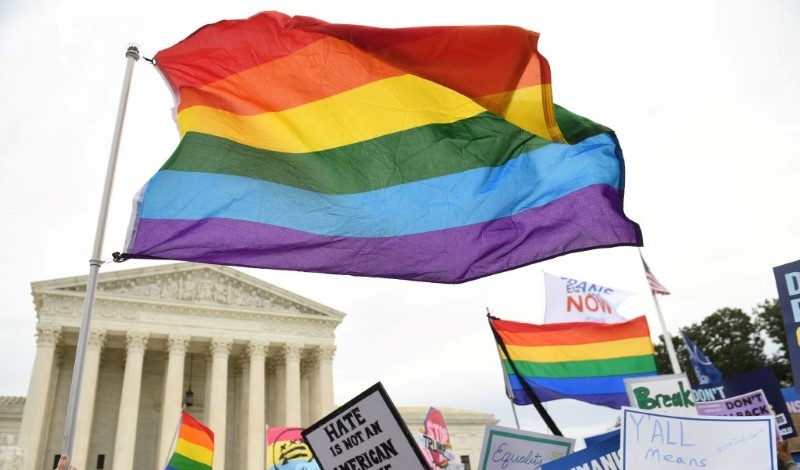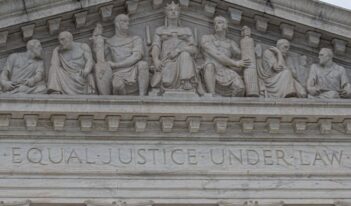
Civil rights attorney argues that recent Supreme Court religious liberty cases jeopardize antidiscrimination laws.
The U.S. Supreme Court held in 1984 that the First Amendment “gives no one the right to insist that, in pursuit of their own interests, others must conform their conduct to his own religious necessities.” But 37 years later, in 2021, the Court ruled that a Catholic organization could refuse to place foster children with same-sex couples on religious grounds.
Can these seemingly incompatible decisions be reconciled? They cannot, contends Louise Melling, Deputy Legal Director at the American Civil Liberties Union.
Melling argues in a recent article that the Supreme Court’s 2021 decision in Fulton v. City of Philadelphia, along with other recent religious liberty rulings, undermines substantial precedent establishing that the U.S. Constitution does not protect the right to publicly discriminate. Such decisions, Melling contends, could upend federal, state, and local antidiscrimination laws and jeopardize the legacy of the civil rights era.
Melling points to the case of 303 Creative LLC v. Elenis, which the Court will rule on sometime in June. 303 Creative concerns a Christian website designer who asserts the right to refuse to create wedding websites for same-sex couples in violation of a state antidiscrimination law.
Melling references Justice Sonia Sotomayor, who stated during the oral arguments for 303 Creative that a ruling for the website designer would mean that businesses can “refuse to serve a customer based on race, sex, religion, or sexual orientation.” Nonetheless, Melling predicts that the Court will rule that people may be exempted from antidiscrimination laws that conflict with their religious beliefs.
Melling explains that, over the last ten years, the Court has become increasingly more willing to indulge and normalize religious liberty claims such as the one underlying 303 Creative.
She identifies decisions where the Court held that the government’s interest in enforcing its antidiscrimination laws does not outweigh the burden imposed on the free exercise of religion. Melling notes that in Fulton, the Court held that Philadelphia’s interest in ensuring the equal treatment of LGBTQ+ foster parents was not compelling enough to warrant denying Catholic Social Services a religious exemption from citywide antidiscrimination law.
Melling argues that the Court’s new approach overlooks the dignity harms suffered by those discriminated against. In 2014, the Court held in Burwell v. Hobby Lobby Stores, Inc. that a company whose owners opposed contraception on religious grounds did not have to provide its employees insurance that covered contraception. The Court concluded that, if contraception coverage furthers women’s equality, “the most straightforward way” to protect women’s interest in obtaining contraception would be for the government—not a private company—to pay for it.
Melling asserts that such logic diminishes a woman’s dignity interest in being treated equally by private individuals and companies, regardless of whether she can access contraception.
According to Melling, the Court is also poised to undermine longstanding doctrines concerning state funding. Traditionally, if the government funds an entity that discriminates, the government is viewed as subsidizing that discrimination. That is why, since the 1960s, the government has required that entities receiving government funding comply with the government’s antidiscrimination laws.
In the Fulton decision, Melling explains, the Court required Philadelphia to continue its foster care services contract with Catholic Social Services, an organization which refused to place foster children with LGBTQ+ individuals. Functionally, the Court mandated state-sponsored discrimination against LGBTQ+ individuals, Melling asserts.
Melling also warns that the Court’s ruling in Our Lady of Guadeloupe School v. Morrissey-Berru could deprive those who work at religious schools of protection from discrimination. In Our Lady of Guadeloupe School, the Court held that, under the First Amendment, antidiscrimination laws do not govern the employment relationship between a religious entity and its ministers. Melling explains that the Court established that the First Amendment bars teachers, who a religious entity may deem to be “ministers,” from bringing disability and age discrimination claims.
Melling predicts that the Court will soon lay the groundwork for a new legal framework to govern religious objectors’ free speech rights. She anticipates that the Court will rule in 303 Creative that the Free Speech Clause of the First Amendment protects people who sell products—such as wedding websites—that express particular messages from having to serve LGBTQ+ individuals.
Melling contends that the Court today tends to sympathize more with those who discriminate than with those facing discrimination. For example, Melling explains that the Court in Fulton emphasized that Catholic Social Services merely sought “an accommodation.” With respect to the interests of the same-sex couples denied the opportunity to start a family, the Court said very little. Likewise, Melling notes that in 303 Creative, the website designer casts herself as a victim oppressed by the state’s authoritative “orthodoxy.”
Melling asserts that federal, state, and local antidiscrimination statutes serve not as “tools of authoritarianism”—which, according to Melling, is how the plaintiff in 303 Creative would describe them—but instead as “tools of liberation.”
Melling warns that the Court’s recent religious liberty decisions constitutes much more than “idle disputes over legal doctrine.” She argues that each ruling in favor of religious exemptions to antidiscrimination laws further erodes decades of precedent expanding the principles of equality to all.



